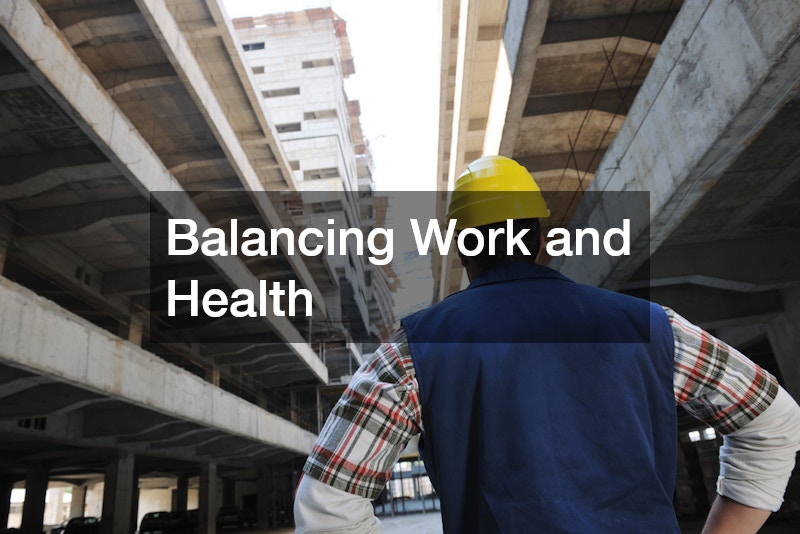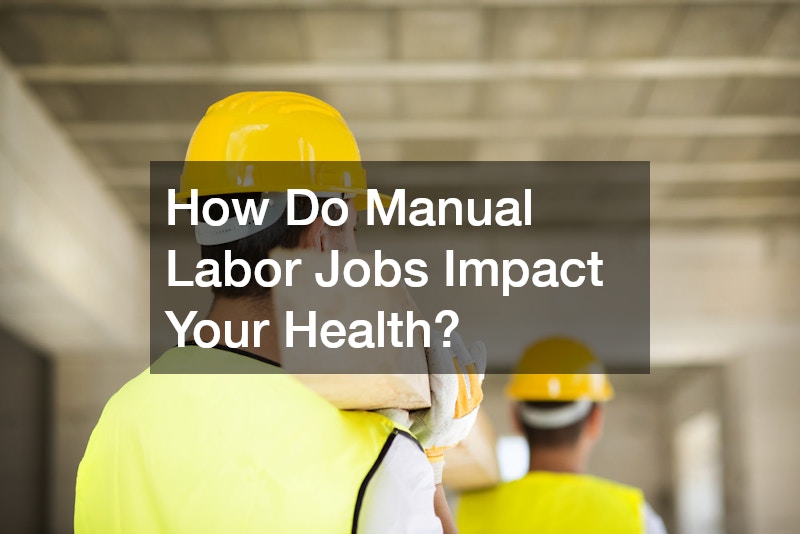Manual labor jobs are essential to our economy and infrastructure, encompassing a wide range of occupations from dock builders to roofers. These jobs often involve physically demanding tasks, and while they offer financial stability and a sense of accomplishment, they can also have significant impacts on workers’ health. Understanding these effects is crucial for both employers and employees to promote safer working conditions and better health outcomes. This article delves into the various ways manual labor jobs, such as those in the construction, maintenance, and service sectors, influence physical and mental health.
Physical Health Risks
Manual labor jobs frequently involve strenuous physical activities that can lead to various health issues. For instance, dock builders and movers often lift heavy loads, which can result in musculoskeletal disorders. Conditions like back pain, joint injuries, and repetitive strain injuries are prevalent among those in physically demanding roles. Additionally, workers involved in tasks such as concrete cutting or installing under deck drain systems may be exposed to hazardous materials or vibrations that can further exacerbate health risks. Maintaining proper ergonomics and using correct lifting techniques is essential to mitigate these dangers, but many workers lack the training necessary to protect themselves effectively.
Impact of Environmental Factors
The environments in which manual laborers work can also pose health risks. For example, roofers are often exposed to extreme weather conditions, including heat, cold, and precipitation, which can lead to heat stress or hypothermia. Similarly, workers in tree services may find themselves at risk of falls, cuts, or other injuries when operating heavy machinery or climbing. Proper safety protocols, including personal protective equipment (PPE) and regular training, are essential to help mitigate these risks. Furthermore, workers in car repair or garage door services may be exposed to harmful chemicals and fumes, necessitating adequate ventilation and protective measures to prevent long-term health effects.
Mental Health Considerations
While the physical toll of manual labor jobs is often emphasized, the mental health impacts are equally significant. Workers in the field construction union, for instance, may experience high levels of stress due to job demands, deadlines, and safety concerns. This stress can lead to anxiety, depression, and burnout, negatively affecting overall well-being. Additionally, the lack of job security and irregular work hours typical in many manual labor jobs can exacerbate these mental health issues. Employers need to foster a supportive work environment that promotes mental wellness, providing resources such as counseling and stress management programs to help employees cope with these challenges.
Social Dynamics and Support Systems
The social dynamics within manual labor jobs can significantly influence workers’ health outcomes. Colleagues often form close-knit communities, which can provide essential support and camaraderie. However, these relationships can also lead to unhealthy competition and pressure to work beyond one’s limits. For example, movers and dock builders might feel compelled to lift more or work faster to meet peer expectations, putting their health at risk. Encouraging a culture of safety, where workers prioritize their well-being over competition, can help improve both physical and mental health outcomes.

Preventive Measures and Health Programs
Implementing preventive measures in manual labor jobs can significantly enhance workers’ health. Organizations involved in tree services, concrete cutting, or garage door services should invest in health programs that educate workers about injury prevention and proper techniques. Regular health screenings and access to physical therapy can help identify potential health issues before they become serious problems. Additionally, companies can promote healthier lifestyles by encouraging exercise and providing access to wellness resources. This proactive approach not only benefits the workers but can also reduce costs associated with healthcare and absenteeism for employers.
Training and Education
Training and education play critical roles in maintaining health in manual labor jobs. For instance, a pool company and field construction unions often provide training that covers safety practices and equipment handling, helping to reduce accidents on the job. Similarly, dock builders and roofers benefit from learning about the latest safety regulations and best practices. However, continuous education is essential as techniques and safety standards evolve. Providing ongoing training ensures that workers are aware of new risks and can implement safer practices, ultimately reducing injury rates and promoting long-term health.
The Role of Ergonomics
Ergonomics is a crucial aspect of health in manual labor jobs. Many tasks, such as those performed by movers or in concrete cutting, require repetitive motions or awkward postures, which can lead to chronic pain and injury. Employers should assess workstations and tasks to identify ergonomic risks and make necessary adjustments. For instance, using proper lifting techniques and tools designed to reduce strain can significantly decrease the likelihood of injuries. Training workers on these principles can empower them to take control of their health while on the job, leading to a safer work environment.
Occupational Health Services
Access to occupational health services is vital for manual laborers. These services can provide essential resources for injury prevention, health screenings, and rehabilitation. Companies in industries like car repair or tree services should ensure their employees have access to healthcare professionals who understand the specific risks associated with their jobs. Regular check-ups can help detect early signs of health issues, allowing for timely intervention. Moreover, having health professionals on-site can encourage a culture of safety and well-being, where employees feel supported in managing their health.

Balancing Work and Health
Finding a balance between work and health can be particularly challenging in manual labor jobs. The demanding nature of jobs like dock building or roof repairs often leads workers to prioritize productivity over their health. However, promoting a healthy work-life balance is essential for maintaining overall well-being. Employers can encourage this balance by implementing flexible work schedules, providing adequate time off, and fostering a culture where taking breaks is normalized. Supporting workers in managing their time effectively can lead to improved health outcomes and increased job satisfaction.
Long-Term Health Outcomes
The long-term health outcomes for manual laborers can vary widely based on the nature of their work and the measures taken to protect their health. Workers in jobs with high physical demands, such as movers and dock builders, may experience chronic pain or degenerative conditions if they do not take preventive measures. On the other hand, those in industries like garage door services or tree services, where safety protocols are strictly followed, may enjoy healthier, longer careers. Understanding the long-term implications of manual labor is crucial for both employees and employers to develop strategies that promote sustainable health practices.
The Importance of Supportive Policies
Supportive workplace policies can significantly enhance the health and safety of manual laborers. Policies that promote injury prevention, provide access to healthcare, and encourage a healthy work-life balance are essential. For example, a field construction union could advocate for stronger safety regulations and comprehensive health benefits for workers. These policies not only protect workers but also improve overall productivity and job satisfaction. Employers must recognize the value of investing in the health of their employees, as a healthy workforce is often more engaged and productive.
Mental Health Resources
Given the high levels of stress associated with many manual labor jobs, access to mental health resources is critical. Employers in industries like car repair or concrete cutting should provide employees with access to counseling services and mental health programs. Creating an environment where mental health is prioritized can help reduce stigma and encourage workers to seek help when needed. Training managers to recognize signs of mental health struggles can also facilitate early intervention, helping employees find the support they need to maintain their well-being.

Community and Connection
Building a sense of community among manual laborers can positively impact their health. For instance, workers in tree services or dock building can benefit from peer support, which can reduce feelings of isolation and improve morale. Employers can foster this sense of community through team-building activities, open communication, and creating safe spaces for workers to share their experiences. Encouraging connections among employees not only enhances job satisfaction but also creates a support system that can be invaluable during challenging times.
Physical Fitness and Active Lifestyles
One of the most significant benefits of manual labor jobs is the promotion of physical fitness. Occupations such as dock builders, roofers, and movers require regular physical activity, which can help workers maintain a healthy weight and improve cardiovascular health. Engaging in tasks like lifting, climbing, and walking can contribute to increased muscle strength and endurance. Unlike sedentary office jobs, manual labor promotes an active lifestyle, which is essential for preventing chronic diseases such as obesity, diabetes, and heart disease. Workers often find that the physical demands of their jobs keep them fit and energized, enhancing their overall quality of life.
Skill Development and Job Satisfaction
Manual labor jobs often involve specialized skills that workers develop over time. For instance, tree services, concrete cutting, and car repair require a certain level of expertise that can lead to professional growth. As workers gain experience and knowledge, they may take on more complex tasks, leading to increased job satisfaction. The sense of accomplishment that comes from mastering a skill or completing a challenging project can boost self-esteem and overall happiness. Moreover, many manual labor roles offer opportunities for certification and advancement within the field, providing a clear pathway for career development and financial stability.
Community and Teamwork
Manual labor jobs frequently foster a sense of community among workers. For instance, those in field construction unions or tree services often collaborate closely with colleagues, creating strong bonds and a supportive work environment. This camaraderie can enhance job satisfaction and promote mental well-being. Working as part of a team not only makes the job more enjoyable but also provides a built-in support system for sharing challenges and celebrating successes. The social interactions and friendships developed in these roles can lead to increased morale and a sense of belonging, which are vital for overall mental health.

Connection to Nature and Environment
Many manual labor jobs, such as those in tree services and landscaping, allow workers to connect with nature. This connection can have profound benefits for mental health, as studies have shown that spending time outdoors and engaging with the environment can reduce stress and improve mood. Workers often report feeling more fulfilled and happier when they see the tangible results of their labor, such as a beautifully landscaped yard or a newly constructed dock. This sense of accomplishment, combined with the mental health benefits of being in nature, underscores the positive impact that manual labor jobs can have on overall well-being.
Financial Stability and Economic Empowerment
Another significant benefit of manual labor jobs is the financial stability they can provide. Many positions in sectors like car repair, garage door services, and construction offer competitive wages and the potential for overtime pay, which can contribute to a better quality of life. This financial security allows workers to support their families, invest in education, and plan for the future. Furthermore, many manual labor jobs come with opportunities for advancement, enabling workers to increase their income over time. This economic empowerment can reduce stress related to financial uncertainty and improve overall mental health. Having a stable income not only enhances daily living conditions but also fosters a sense of independence and self-sufficiency, which are crucial for long-term well-being.
Conclusion: The Path Forward
In conclusion, manual labor jobs have both positive and negative impacts on health. While they offer opportunities for physical activity and financial stability, they also pose risks related to physical and mental well-being. By prioritizing safety, providing education, and fostering supportive workplace cultures, employers can help mitigate these risks. Workers in fields such as dock building, concrete cutting, and tree services must also take an active role in protecting their health. Together, through awareness, proactive measures, and community support, we can improve the health outcomes for those in manual labor jobs, ensuring they thrive both on and off the job.
As we move forward, it is essential to cultivate a culture that not only values the contributions of manual laborers but also actively promotes their health and wellness. By doing so, we can ensure that those who engage in these vital roles continue to thrive, both professionally and personally, creating a healthier workforce and community overall. Embracing the positive aspects of manual labor can lead to sustainable practices that benefit everyone involved, ultimately enhancing the quality of life for workers and society as a whole.


